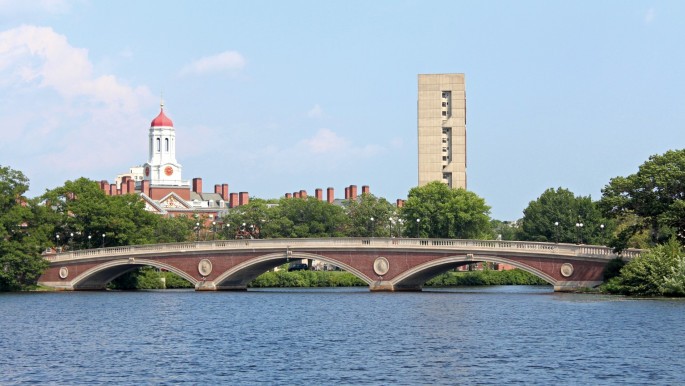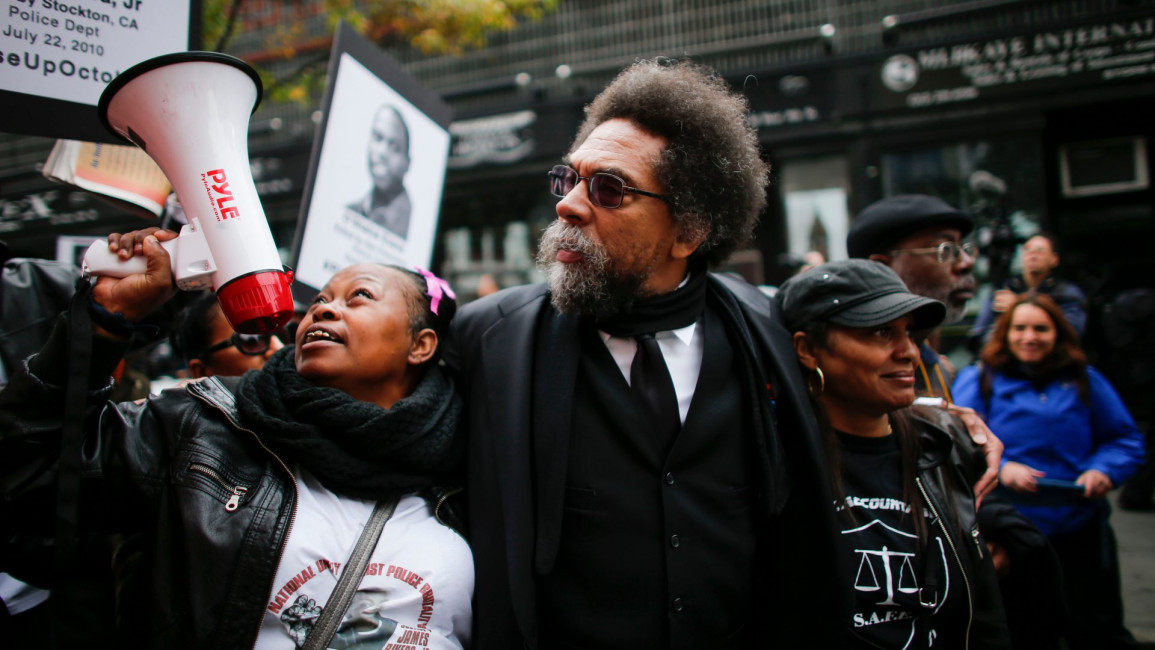Renowned professor Cornel West claims Harvard tenure refusal 'linked to pro-Palestine stance'
Renowned professor Cornel West claims Harvard tenure refusal 'linked to pro-Palestine stance'
West left Harvard University amid a controversy over his consideration for tenure.
2 min read
West has voiced support for the BDS movement [Getty]
Outspoken professor Dr Cornel West has suggested he was denied tenure by Harvard University due to his pro-Palestine activism.
The world-renowned Black philosopher left his position at the Ivy League university last week after it emerged earlier this year Harvard would not consider him for tenure.
West says the decision was likely linked to his political activism, specifically around his views on Israel and Palestine.
"What's happening now in this reactionary moment in both the United States and Israel – our gangster is gone, yours is still in place – [is that] the neoliberal hegemony in the universities is still very reluctant to have a robust, respectful, free dialogue on what's going on, past and present, when it comes to Israeli and Palestinian issue," West told Haaretz.
The philosopher, who has since joined New York's Union Theological Seminary, has been outspoken in his opposition of the Israeli occupation of the West Bank.
West has endorsed the Palestinian-led Boycott, Divestment and Sanctions (BDS) movement.
Rabbi Jonah Steinberg, executive director of the Harvard branch of the Hillel Jewish campus organisation, has accused West of "scapegoating and demonising" Jewish people amid the tenure controversy.
A student petition that links Harvard's decision to West's opposition to "the settler colonial violence of Israel's occupation of Palestine" is an "anti-Semitic conspiracy theory", Steinberg claimed last week.
West has stated his criticism of Israel has "nothing to do whatsoever with anti-Jewish prejudice".
"It's a moral and spiritual issue across the board, and one tries to be consistent in that regard," he told Haaretz.
West added that he had invited Rabbi Steinberg to have a "serious" discussion about the dispute.
"Let's go at it, that's what students need. Not just at Harvard, but anywhere and everywhere," he said.
Despite linking his departure from Harvard to the "taboo" around criticising Israel, West says he believes it is becoming easier to discuss the issue in the United States.
"To use Harvard's motto, it cannot but be a move toward veritas, toward truth, and the condition of truth is to allow suffering to speak. It's harder for defenders of Israel who act as if the occupation either doesn't exist or is some tertiary element, and therefore overlook the suffering and social misery of Palestinians," he said. "Their position is increasingly weaker, and this situation reveals this."
Follow us on Facebook, Twitter and Instagram to stay connected
The world-renowned Black philosopher left his position at the Ivy League university last week after it emerged earlier this year Harvard would not consider him for tenure.
West says the decision was likely linked to his political activism, specifically around his views on Israel and Palestine.
"What's happening now in this reactionary moment in both the United States and Israel – our gangster is gone, yours is still in place – [is that] the neoliberal hegemony in the universities is still very reluctant to have a robust, respectful, free dialogue on what's going on, past and present, when it comes to Israeli and Palestinian issue," West told Haaretz.
The philosopher, who has since joined New York's Union Theological Seminary, has been outspoken in his opposition of the Israeli occupation of the West Bank.
West has endorsed the Palestinian-led Boycott, Divestment and Sanctions (BDS) movement.
Rabbi Jonah Steinberg, executive director of the Harvard branch of the Hillel Jewish campus organisation, has accused West of "scapegoating and demonising" Jewish people amid the tenure controversy.
 |
| Read more: Harvard Jewish students form pro-Palestine, 'anti-Zionist' group |
A student petition that links Harvard's decision to West's opposition to "the settler colonial violence of Israel's occupation of Palestine" is an "anti-Semitic conspiracy theory", Steinberg claimed last week.
West has stated his criticism of Israel has "nothing to do whatsoever with anti-Jewish prejudice".
"It's a moral and spiritual issue across the board, and one tries to be consistent in that regard," he told Haaretz.
West added that he had invited Rabbi Steinberg to have a "serious" discussion about the dispute.
"Let's go at it, that's what students need. Not just at Harvard, but anywhere and everywhere," he said.
Despite linking his departure from Harvard to the "taboo" around criticising Israel, West says he believes it is becoming easier to discuss the issue in the United States.
"To use Harvard's motto, it cannot but be a move toward veritas, toward truth, and the condition of truth is to allow suffering to speak. It's harder for defenders of Israel who act as if the occupation either doesn't exist or is some tertiary element, and therefore overlook the suffering and social misery of Palestinians," he said. "Their position is increasingly weaker, and this situation reveals this."
Follow us on Facebook, Twitter and Instagram to stay connected


![President Pezeshkian has denounced Israel's attacks on Lebanon [Getty]](/sites/default/files/styles/image_684x385/public/2173482924.jpeg?h=a5f2f23a&itok=q3evVtko)



 Follow the Middle East's top stories in English at The New Arab on Google News
Follow the Middle East's top stories in English at The New Arab on Google News


